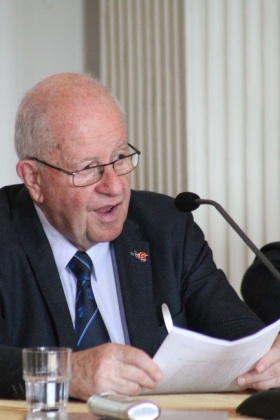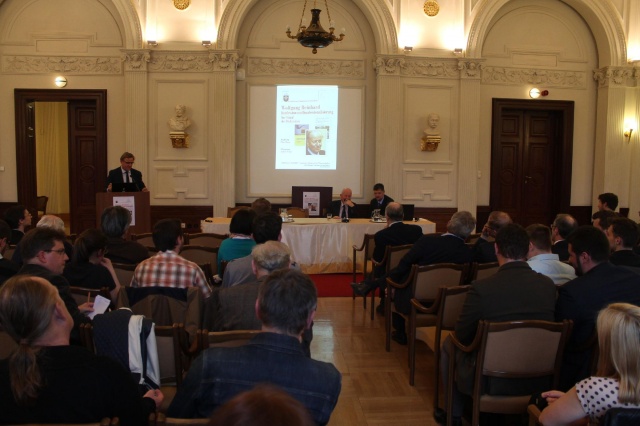”Confession and Confessionalisation in Europe” – Wolfgang Reinhard’s lecture at the Hungarian Academy of Sciences
In parallel with the Protestant Reformation, the Catholic “Counter-Reformation” also contributed to the modernization of European society – states the many-decade-long research that Wolfgang Reinhard, the professor emeritus of the Albert-Ludwig University in Freiburg, discussed during the last scholarly event of the MTA-PPKE Momentum (Lendület) Church History Research Institute founded back in 2012.
23 May, 2017
According to Péter Tusor, head of the research institute, Mr. Reinhard is the most significant German historian since Leopold von Ranke (1795–1886). As an expert in Vatican Archives sources, Mr. Reinhard recalled the circumstances of the creation of the confessionalisation model in 1977 and certain stages of the forty-year-old history of the theory.
 Wolfgang Reinhard Source: ujkor.hu
Wolfgang Reinhard Source: ujkor.huBetween 1977 and 2010 professor Reinhard had already written six studies regarding confessionalisation. He had also given his ideas much consideration and reacted to multiple criticisms. In his 1977 work, he pointed out that in parallel with the Protestant Reformation, the Catholic “Counter-Reformation” had also contributed to the modernization of European society. In 1981, to mark the jubilee of the Augustan Confession (Confessio Augustana) in the previous year, he readdressed the topic by going back to Ernst Walter Zeeden’s idea of the “age of confessionalisation”. The Counter-Reformation is not mentioned here as one of the stages of the three-stage dialectic model (reformation/counter-reformation/confrontation), but is examined in parallel with other confessions which occurred in the 1500’s (German Lutheran – Mediterranean Tridentine Catholic – Swiss Calvinist – Anglican). He also analysed these confessions’ spiritual, mental and social modernizing role that indicated the same direction.
Wolfgang Reinhard analysed the confessionalisation not only in the context of the German territorial churches: he also covered France and Italy in his research. He suggested that he had demonstrated in 2010 how the new confessions had been established and determined themselves; why the viable ones could survive and many other initiatives had disappeared (like that of the Anabaptists, Anti-Trinitarians), or been confined to the periphery.

In the second half of his lecture, Wolfgang Reinhard addressed the latest criticism his idea received; he also reviewed his model in terms of cultural anthropology. He outlined the existence of the inter- and trans-confessional phenomena, however, he immediately added that these are exceptional cases, they do not imply the refutation of the whole thesis.
According to the final conclusion of the professor, the model of confessionalisation – which proved to be a relevant and developing paradigm in the recognition and comprehension of European history – values the religious processes of the early modern period not in terms of historical action/counteraction, but the parallelism of modernisation.
The event was organized within the international programmes of the 500th Jubilee of the Reformation within the scope of the Momentum project and by the assistance of the Hungarian Academy of Sciences. Further details are available on the Momentum Research Institute’s website: http://institutumfraknoi.hu/
